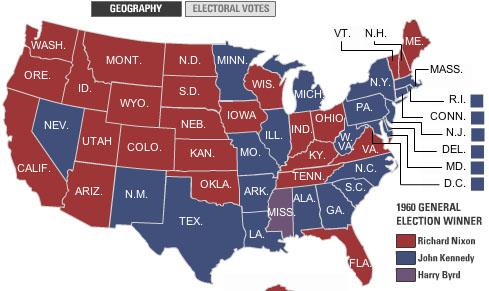
The election of 1960 was hotly contested.
Republican Vice President Richard M. Nixon only lost the popular vote by 118,524. But if you subtract the six rogue electors from Alabama, who refused to endorse Massachusetts Senator John F. Kennedy, Nixon would have won the popular vote by 58,000; even though he lost in the electoral college 219 to 303.
In the House and the Senate, Democrats held a very comfortable majority — 262 out of 435; and 64 out of 100.
In his inaugural address given on January 20, 1961, then-president Kennedy near the end spoke these memorable words:
ask not what your country can do for you — ask what you can do for your country.
Finally ending with:
With a good conscience our only sure reward, with history the final judge of our deeds, let us go forth to lead the land we love, asking His blessing and His help, but knowing that here on earth God's work must truly be our own.
Today is the 32nd Sunday in Ordinary Time, and our readings focus on sacrifice.
In both the Old Testament reading and the Gospel we hear of two widows. One who gave what food she had to a stranger, and the other who gave everything that she had.
The word widow is very unique in that it comes out of a single Indo-European root . . . meaning this word, or a variant of this word, has been used for thousands of years and all the languages of the world share a common root dating back to the origins of language.
In both Hebrew and Greek, the languages of the Old and New Testament, the word for widow is related to the word for a chasm or a desolate place.
Yet in both of these Bible stories, the widows give from their need — not from their surplus. The depth of their sacrifice made a noticeable dent in their lives. Or, in other words, they both gave until it hurt.
As we continue our sequential reading through Hebrews, the writer points out the superiority of Jesus’s sacrifice. Where in the Old Law, the priest sacrificed an ox and sprinkled the altar with its blood; Jesus sacrificed Himself for our salvation, in His own Body and with His own Blood.
Where the Temple was meant to be a model . . . an image . . . and icon of Heaven, Jesus ascended into Heaven at God’s right hand, making “a holy sacrifice” on our behalf in the presence of God the Father.
The offerings of the two widows from their need is a model . . . an image . . . an icon of Christ’s own self-gift . . . His kenosis . . . His total self-emptying sacrifice.
Jesus’s sacrifice is once-for-all, perfect, and complete. And we re-present it here on this altar for the you and your intentions.
I will close with a Danish proverb. Like Kennedy’s famous “ask not” quote, it should leave us with a challenge.
What you are is God’s gift to you. What you do is your gift to God.
As we approach this altar to receive the Sacred Body and Blood, Soul and Divinity of Jesus Christ; let us ask ourselves — “How shall I make a return to the Lord, for all the good He has done for me.”
Let us take what we have, and who we are . . . and through our thoughts, words, and deeds . . . make a worthy sacrifice to God, united with Christ Jesus, and in the power of the Holy Spirit.




